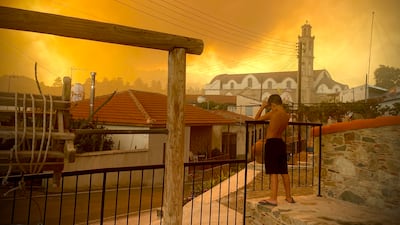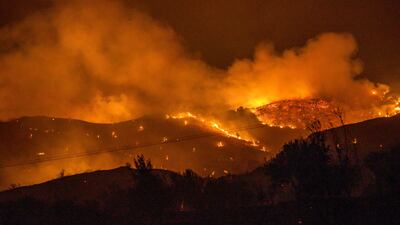A former Dubai resident caught up in the forest fire that ravaged through Cyprus at the weekend said “it was like something from the apocalypse”.
Freelance journalist Andrea Anastasiou told The National she was terrified as she fled with her family from the inferno that swept through the village of Ora.
The fire, which broke out on Saturday afternoon, was the worst to hit Cyprus in decades, authorities said.
Four Egyptian workers were killed in the blaze, which destroyed 50 homes, forced the evacuation of 10 villages and caused power cuts and widespread damage to farms.
It was terrifying and traumatising, especially when we were leaving the village and seeing people on the side of the road crying
Andrea Anastasiou
“Ash was falling everywhere. The sky was completely yellow and the sun was a blood-red colour. It was so scary,” the British-Cypriot said.
“All I remember is clouds of smoke heading towards us and realising we had to get out of there quickly.
“It was terrifying and traumatising, especially when we were leaving the village and seeing people on the side of the road crying.”
She said her family and neighbours feared they would never see their homes again as the blaze continued to spread.
The fire, which scorched more than 55 square kilometres of farmland and forest in the Troodos mountain range, was eventually brought under control on Sunday afternoon.
The Cypriot government reported a reduction in outbreaks owing to “effective water drops by Greek and Israeli aircraft”.
Anastasiou, 38, who left Dubai in late 2019, has spent the pandemic with her family in the village of Ora.
A photograph she took of a young neighbour from the village watching the oncoming fire has gone viral.
“I saw the young boy looking up at the fire and I knew it would make a powerful image,” she said.
“I grabbed the shot but just at that the fire was getting worse and people started yelling to get out of the village.”
This led to a frantic dash with her mother and sister to get into a car, before picking up her grandparents on their way out of Ora.
“People were bawling their eyes out crying and I had to shout at my grandfather to get into the car as he was confused by everything happening,” she said.
“There was another neighbour who was refusing to leave his home.
“It was all happening so fast and everyone was wondering if we would ever see the village again.”
Thankfully for Anastasiou and her family, their home emerged unscathed.
The President of Cyprus, Nicos Anastasiades, tweeted that the blaze had been a tragedy and the largest on the island since 1974.
The remains of the Egyptian workers who died in the blaze were discovered outside the village of Odos in Larnaca, 600 metres away from their burnt-out vehicle, which lay at the bottom of a ravine.
The men, aged 22 to 29, had gone missing Saturday afternoon when the fire began outside the nearby village of Arakapas and spread quickly amid strong winds.
A 67-year-old farmer has been arrested and remanded in custody on suspicion of causing the blaze.
Police said he was spotted by a witness leaving the village of Arakapas in his car at around the same time as the fire started there.
UAE SQUAD
Mohammed Naveed (captain), Rohan Mustafa, Ashfaq Ahmed, Rameez Shahzad, Shaiman Anwar, Mohammed Usman, Mohammed Boota, Zawar Farid, Ghulam Shabber, Ahmed Raza, Sultan Ahmed, Imran Haider, Qadeer Ahmed, Chirag Suri , Zahoor Khan
Frankenstein in Baghdad
Ahmed Saadawi
Penguin Press
Financial considerations before buying a property
Buyers should try to pay as much in cash as possible for a property, limiting the mortgage value to as little as they can afford. This means they not only pay less in interest but their monthly costs are also reduced. Ideally, the monthly mortgage payment should not exceed 20 per cent of the purchaser’s total household income, says Carol Glynn, founder of Conscious Finance Coaching.
“If it’s a rental property, plan for the property to have periods when it does not have a tenant. Ensure you have enough cash set aside to pay the mortgage and other costs during these periods, ideally at least six months,” she says.
Also, shop around for the best mortgage interest rate. Understand the terms and conditions, especially what happens after any introductory periods, Ms Glynn adds.
Using a good mortgage broker is worth the investment to obtain the best rate available for a buyer’s needs and circumstances. A good mortgage broker will help the buyer understand the terms and conditions of the mortgage and make the purchasing process efficient and easier.
Paatal Lok season two
Directors: Avinash Arun, Prosit Roy
Stars: Jaideep Ahlawat, Ishwak Singh, Lc Sekhose, Merenla Imsong
Rating: 4.5/5
ALRAWABI%20SCHOOL%20FOR%20GIRLS
%3Cp%3ECreator%3A%20Tima%20Shomali%3C%2Fp%3E%0A%3Cp%3EStarring%3A%C2%A0Tara%20Abboud%2C%C2%A0Kira%20Yaghnam%2C%20Tara%20Atalla%3C%2Fp%3E%0A%3Cp%3ERating%3A%204%2F5%3C%2Fp%3E%0A
Business Insights
- As per the document, there are six filing options, including choosing to report on a realisation basis and transitional rules for pre-tax period gains or losses.
- SMEs with revenue below Dh3 million per annum can opt for transitional relief until 2026, treating them as having no taxable income.
- Larger entities have specific provisions for asset and liability movements, business restructuring, and handling foreign permanent establishments.
UAE currency: the story behind the money in your pockets
Gulf Under 19s final
Dubai College A 50-12 Dubai College B
Mercer, the investment consulting arm of US services company Marsh & McLennan, expects its wealth division to at least double its assets under management (AUM) in the Middle East as wealth in the region continues to grow despite economic headwinds, a company official said.
Mercer Wealth, which globally has $160 billion in AUM, plans to boost its AUM in the region to $2-$3bn in the next 2-3 years from the present $1bn, said Yasir AbuShaban, a Dubai-based principal with Mercer Wealth.
“Within the next two to three years, we are looking at reaching $2 to $3 billion as a conservative estimate and we do see an opportunity to do so,” said Mr AbuShaban.
Mercer does not directly make investments, but allocates clients’ money they have discretion to, to professional asset managers. They also provide advice to clients.
“We have buying power. We can negotiate on their (client’s) behalf with asset managers to provide them lower fees than they otherwise would have to get on their own,” he added.
Mercer Wealth’s clients include sovereign wealth funds, family offices, and insurance companies among others.
From its office in Dubai, Mercer also looks after Africa, India and Turkey, where they also see opportunity for growth.
Wealth creation in Middle East and Africa (MEA) grew 8.5 per cent to $8.1 trillion last year from $7.5tn in 2015, higher than last year’s global average of 6 per cent and the second-highest growth in a region after Asia-Pacific which grew 9.9 per cent, according to consultancy Boston Consulting Group (BCG). In the region, where wealth grew just 1.9 per cent in 2015 compared with 2014, a pickup in oil prices has helped in wealth generation.
BCG is forecasting MEA wealth will rise to $12tn by 2021, growing at an annual average of 8 per cent.
Drivers of wealth generation in the region will be split evenly between new wealth creation and growth of performance of existing assets, according to BCG.
Another general trend in the region is clients’ looking for a comprehensive approach to investing, according to Mr AbuShaban.
“Institutional investors or some of the families are seeing a slowdown in the available capital they have to invest and in that sense they are looking at optimizing the way they manage their portfolios and making sure they are not investing haphazardly and different parts of their investment are working together,” said Mr AbuShaban.
Some clients also have a higher appetite for risk, given the low interest-rate environment that does not provide enough yield for some institutional investors. These clients are keen to invest in illiquid assets, such as private equity and infrastructure.
“What we have seen is a desire for higher returns in what has been a low-return environment specifically in various fixed income or bonds,” he said.
“In this environment, we have seen a de facto increase in the risk that clients are taking in things like illiquid investments, private equity investments, infrastructure and private debt, those kind of investments were higher illiquidity results in incrementally higher returns.”
The Abu Dhabi Investment Authority, one of the largest sovereign wealth funds, said in its 2016 report that has gradually increased its exposure in direct private equity and private credit transactions, mainly in Asian markets and especially in China and India. The authority’s private equity department focused on structured equities owing to “their defensive characteristics.”
More from Rashmee Roshan Lall



















